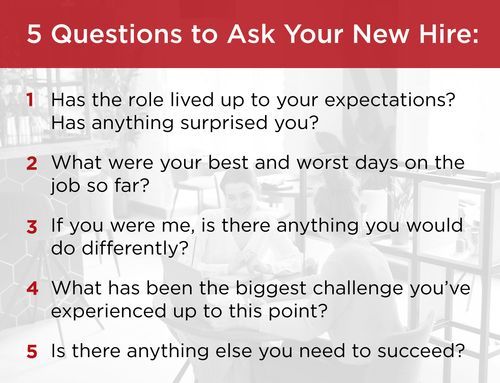5 Questions You Should be Asking Your New Employee
5 Questions You Should be Asking Your New Employee
Posted on September 1, 2019
After the initial onboarding period, it’s easy to get so accustomed to the presence of your newest team member that you simply leave them to get on with their role. We get it – it’s hard to make time for everything when you’re busy, but ‘set and forget’ isn’t the best way to get the most out of your new hire. Once the first few months on the job are behind them, it’s well worth your while to check-in and make sure everything really is going as smoothly as it seems to be.
To find out how they’re doing in their role, gather useful feedback and ensure you have the chance to nip any potential problems in the bud, here are our top five questions to ask new employees.
Has the role lived up to your expectations? Has anything surprised you?
An employee’s first impression can make or break their long-term relationship with the business. While this technically begins in the hiring process, their ‘second first impression’ – when they officially start in the role – is just as important.
From the job advert through to the offer, they will have had a certain expectation of what the job was going to be. Even if you think you’re on the same page, it’s still a good idea to ask them about their feelings early on and see if the job is what they thought it would be. A lot of candidates we speak to have decided to move on due to early-stage job disappointment, so take it from us – it’s much better to find out early on than have to advertise the role again just a few months down the track. Now’s the time to address any areas of the role where the new person is feeling unprepared or even dissatisfied, and see if you can work up a solution that is mutually agreeable.
Asking this question also gives you a great chance to evaluate how consistent you’ve been from beginning to end; did the job ad match up to reality? Were you clear enough in the interview? This can help you find ways to improve future hiring processes.
What were your best and worst days on the job so far?
A lot can happen in the first few days, weeks and months of employment – it’s a hectic time for everyone! That’s why it can be useful to gather insights into what your employee values about their job or the progress they’ve made so far. Do they feel proud of their achievements? What are their goals for the near future and how close do they feel they are to achieving them?
Asking these questions will not only highlight successes to be celebrated, but also where the new person may be struggling. That way, you can offer to step in if they need some extra help, before it gets out of hand.
If you were me, is there anything you would do differently?
People might answer this question in several different ways, but how they respond can reveal their feelings about your management style so far. For example, where they may feel unsupported, or whether they’re feeling overwhelmed by the current workload expectations.
Even if you don’t take every idea on board (and often, this isn’t realistic), having the chance to listen and provide feedback to the employee in turn helps them to know they have a voice and that their feelings matter. Whether your office has a casual vibe or it’s more corporate and formal, employees always feel most at ease when they can talk honestly and openly.
What has been the biggest challenge you’ve experienced up to this point?
Here’s your chance to dig past the surface and really get to the heart of any brewing issues. This could be anything from an unhelpful team member to a process the new person finds confusing.
If they express any concerns, hold off on making empty promises until you’ve probed a little deeper (however much you might want to say something that will fix the situation). These insights can inspire alternative ways for the company to approach current systems or processes, or help you identify areas where more training is needed.
Is there anything else you need to succeed?
At this point, the new team member has spent enough time with your company to start to get an idea of how they can improve in their role or what might help them to do better. Ideally, they will take some initiative to make these steps on their own, but prompting them with this question can ensure that changes happen where they need to.
Our advice is to remember that workplace success is not ‘one size fits all’. Each person has their own way to thrive, so working on an individual basis will help you get the most out of everyone. This could entail more regular check-ins, further development on a specific area, additional equipment or even assigning someone to act as their “go-to” person.
Plenty of us feel shy about expressing what could be considered weakness, so don’t forget to reassure them that it’s okay to ask for the extra support they need and that you are there to help them succeed.

Summary
The first few months of employment is a time for the new person to get to know your business, and for you to learn more about them in turn. Asking these five key questions will help you ensure everything is going smoothly, give you the tools to manage them in the best way and, ultimately, understand how they will fit into the team long-term.
To start your recruitment journey and discover top talent who make a difference, get in touch with the team at People Equity.
Share this article











